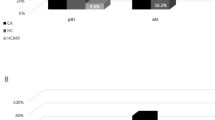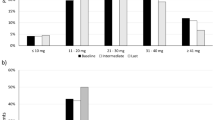Abstract
Since the optimal glucocorticoid replacement needs to avoid over and under treatment, the adequacy of different daily cortisone acetate (CA) doses was assessed in 34 patients with primary and central hypoadrenalism. The conventional twice CA 37.5 mg/day dose was administered to all patients (A regimen: 25 mg at 07:00 h, 12.5 mg at 15:00 h), while in 2 subgroups of 12 patients the dose was shifted on 2 thrice daily regimens (B: 25 mg at 07:00, 6.25 mg at 12: 00, 6.25 mg at 17:00; C: 12.5 mg, 12.5 mg, 12.5 mg). In other 12 patients the conventional dose was reduced to a thrice 25 mg/day administration (D regimen: 12.5 mg, 6.25 mg, 6.25 mg). In all patients, urinary free cortisol (UFC) excretion and cortisol day curves were evaluated. During the CA 37.5 mg administration, nadir cortisol levels were significantly higher with the thrice daily regimens (143±31 on B and 151±34 nmol/l on C) than with the conventional twice (85±16 nmol/l). Moreover, UFC, morning cortisol levels and mean cortisol day curves were similar in each group. Finally, during D regimen nadir cortisol levels were higher than in A and similar to B and C regimens. No difference in UFC and in cortisol day curves by reducing the CA dose was found. In conclusion, the thrice daily cortisone regimens, in which more physiological cortisol levels are achieved, perform better as replacement therapy. The administration of 25 mg/day CA confirms that replacement therapy is more adequate with a lower dose, particularly in patients with central hypoadrenalism.
Similar content being viewed by others
References
Matsumura K, Abe I, Fukuhara M, et al. Modulation of circadian rhythm of blood pressure by cortisol in patients with hypopituitarism. Clin Expe Hypertens 1994, 16: 55–66.
Zelissen PMJ, Croughs RJM, van Rijk PP, Raymakers JA. Effect of glucocorticoid replacement therapy on bone mineral density in patients with Addison disease. Ann Intern Med 1994, 120: 207–10.
Al Shoumer KS, Beshyah SA, Niththyananthan R, Johnston DG. Effect of glucocorticoid replacement therapy on glucose tolerance and intermediary metabolites in hypopituitary adults. Clin Endocrinol (Oxf) 1995, 42: 85–90.
Dunne FP, Elliott P, Gammage MD, et al. Cardiovascular function and glucocorticoid replacement in patients with hypopituitarism. Clin Endocrinol 1995, 43: 623–9.
Peacey SR, Guo CY, Robinson AM, et al. Glucocorticoid replacement therapy: are patients over treated and does it matter? Clin Endocrinol (Oxf) 1997, 46: 255–61.
Groves RW, Toma GC, Houghton BJ, Monson JP. Corticosteroid replacement therapy: twice or thrice daily. J R Soc Med 1988, 81: 514–6.
Riedel M, Wiese A, Schurmeyer TH, Brabant G. Quality of life in patients with Addison’s disease: effects of different cortisol replacement models. Exp Clin Endocrinol 1993, 101: 106–11.
Howlett TA. An assessment of optimal hydrocortisone replacement therapy. Clin Endocrinol (Oxf) 1997, 46: 263–8.
Wichers M, Springer W, Bidlingmaier F, Klingmuller D. The influence of hydrocortisone substitution on the quality of life and parameters of bone metabolism in patients with secondary hypocortisolism. Clin Endocrinol (Oxf) 1999, 50: 759–65.
Howlett TA. Assessment of glucocorticoid replacement therapy. Endocrinologist 1998, 8: 243–9.
Jeffcoate W. Assessment of corticosteroid replacement therapy in adults with adrenal insufficiency. Ann Clin Biochem 1999, 36: 151–7.
De Vile CJ, Stanhope R. Hydrocortisone replacement therapy in children and adolecsents with hypopituitarism. Clin Endocrinol (Oxf) 1997, 47: 37–41.
Laureti S, Falorni A, Santeusanio F. Improvement of treatment of primary adrenal insufficiency by administration of cortisone acetate in three daily doses. J Endocrinol Invest 2003, 26: 1071–5.
Burch WM. Urine free-cortisol determination. A useful tool in the management of chronic hypoadrenal states. JAMA 1982, 247: 2002–4.
Trainer PJ, McHardy KC, Harvey RD, Reid IV. Urinary free cortisol in the assessment of hydrocortisone replacement therapy. Horm Metab Res 1993, 25: 117–20.
Mah, PM, Jenkins RC, Rostami-Hodjegan A, et al. Weight-related dosing, timing and monitoring hydrocortisone replacement therapy in patient with adrenal insufficiency. Clin Endocrinol (Oxf) 2004, 61: 367–75.
Esteban NV, Loughlin T, Yergey L, et al. Daily cortisol production rate in man determined by stable isotope dilution/mass spectrometry. J Clin Endocrinol Metab 1991, 72: 39–45.
Weaver JU, Thaventhiran L, Noonan K, et al. The effect of growth hormone replacement on cortisol metabolism and glucocorticoid sensitivity in hypopituitary adults. Clin Endocrinol (Oxf) 1994, 41: 639–48.
Rodriguez-Arnao J, Perry L, Besser GM, Ross RJM. Growth hormone treatment in hypopituitary GH deficients adults reduces circulating cortisol levels during hydrocortisone replacement therapy. Clin Endocrinol (Oxf) 1996, 45: 33–7.
Walker BR, Andrew R, MacLeod KM, Padfield PL. Growth hormone replacement inhibits renal and hepatic 11 β-hy-droxisteroid dehydrogenases in ACTH-deficient patients. Clin Endocrinol (Oxf) 1998, 49: 257–63.
Toogood AA, Taylor NF, Shalet SM, Monson JP. Modulation of cortisol metabolism by low-dose Growth Hormone replacement in elderly hypopituitary patients. J Clin Endocrinol Metab 2000, 85: 1727–30.
Tschop M, Lahner H, Feldmeier H, et al. Effects of growth hormone replacement therapy on levels of cortisol and cortisol-binding globulin in hypopituitary adults. Eur J Endocrinol 2000, 143: 769–73.
Swords FM, Carroll PV, Kisalu J, Wood PJ, Taylor NF, Monson JP. The effects of growth hormone deficiency and replacement on glucocorticoid exposure in hypopituitary patients on cortisone acetate and hydrocortisone replacement. Clin Endocrinol (Oxf) 2003, 59: 613–20.
Author information
Authors and Affiliations
Corresponding author
Rights and permissions
About this article
Cite this article
Barbetta, L., Dall’Asta, C., Re, T. et al. Comparison of different regimens of glucocorticoid replacement therapy in patients with hypoadrenalism. J Endocrinol Invest 28, 632–637 (2005). https://doi.org/10.1007/BF03347262
Accepted:
Published:
Issue Date:
DOI: https://doi.org/10.1007/BF03347262




